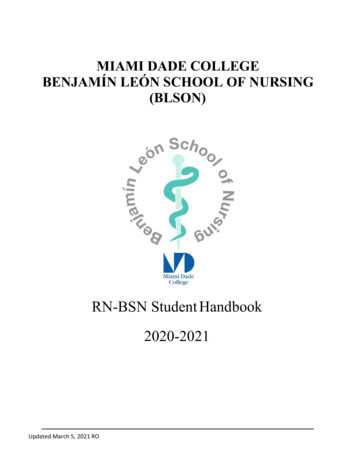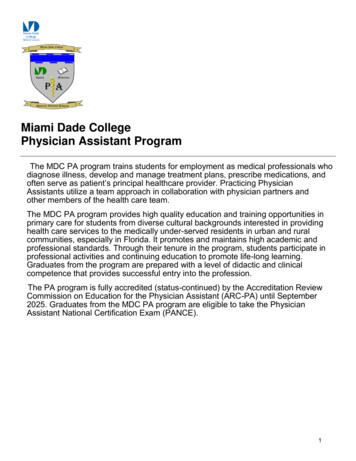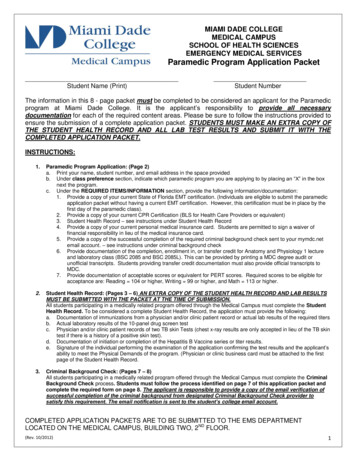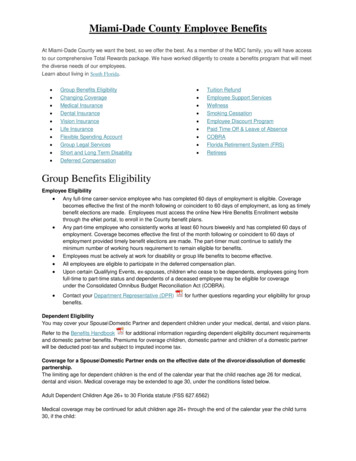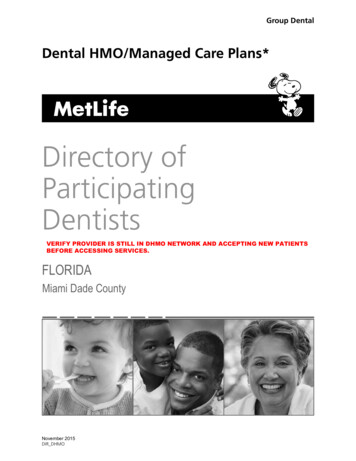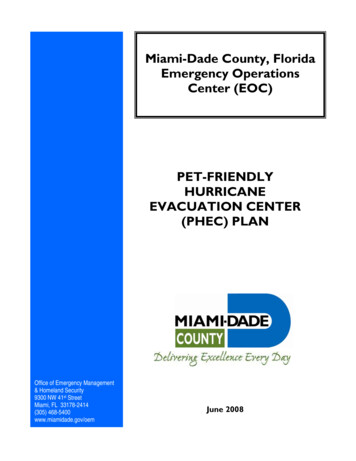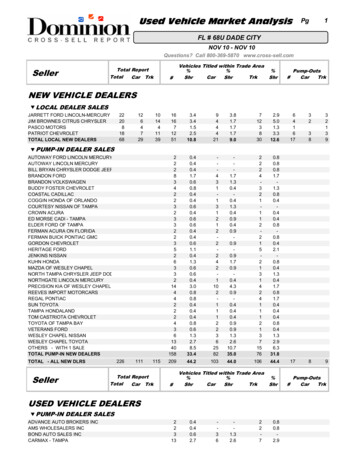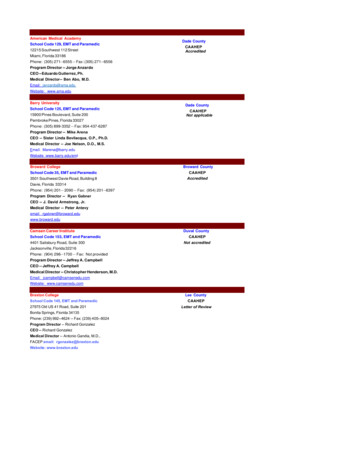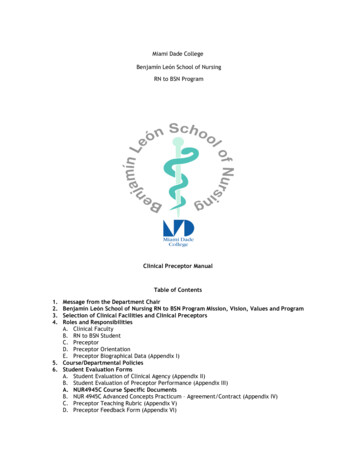
Transcription
Miami Dade CollegeBenjamín León School of NursingRN to BSN ProgramClinical Preceptor ManualTable of Contents1.2.3.4.Message from the Department ChairBenjamín León School of Nursing RN to BSN Program Mission, Vision, Values and ProgramSelection of Clinical Facilities and Clinical PreceptorsRoles and ResponsibilitiesA. Clinical FacultyB. RN to BSN StudentC. PreceptorD. Preceptor OrientationE. Preceptor Biographical Data (Appendix I)5. Course/Departmental Policies6. Student Evaluation FormsA. Student Evaluation of Clinical Agency (Appendix II)B. Student Evaluation of Preceptor Performance (Appendix III)A. NUR4945C Course Specific DocumentsB. NUR 4945C Advanced Concepts Practicum – Agreement/Contract (Appendix IV)C. Preceptor Teaching Rubric (Appendix V)D. Preceptor Feedback Form (Appendix VI)
E. NUR 4945C Advanced Concepts Practicum - STUDENT SIGN-IN SHEET (Appendix VII)7. NUR4636L Course Specific DocumentsA. NUR 4636L Community Health Nursing Practicum – Agreement/Contract (Appendix VIII)B. Preceptor Evaluation Form of Student's Teaching Projects (Appendix IX)C. Preceptor Feedback Form (Appendix X)D. NUR 4636L Community Nursing Practicum - STUDENT SIGN-IN SHEET (Appendix XI)WelcomeMessage from the Department ChairDear Preceptor,Before the semester begins, a faculty member will contact you to discuss course requirements andprovide emails and phone numbers for faculty providing oversight for the student(s). Other documentsdiscussed and provided include but are not limited to a copy of the syllabus, a student schedule, apreceptor agreement form for your signature and our files, and a clinical/preceptor form. In thishandbook, you will find copies of all the necessary documents.We appreciate your dedication and contribution to making this a meaningful learning experience. If youhave any questions, please feel free to contact the student's clinical professor. The clinical professorwill be making agency/site visits or calls throughout the semester. The student and Preceptor willhave contact information about contacting the clinical professor. In addition to providing you with thePreceptor Manual handbook, the student will provide you with a copy of the clinical contract and aschedule of clinical days.Thank you, your most valuable contributions,Guillermo R. Valdes Dr.NP, MSN-HCS, PGC-NEd.,Med. Surg. RN-BC, CMSRNSIGMA Theta Tau Virginia Henderson FellowRN to BSN Program Department ChairBenjamin Leon School of NursingMedical CampusMiami Dade CollegeOffice 305 237 4467gvaldes1@mdc.edu
Benjamín León School of Nursing RN to BSN ProgramMissionThe mission of Miami Dade College Benjamin León School of Nursing (BLSON) is to change lives throughaccessible, high-quality, evidence-based education. The BLSON embraces its responsibility to serve as adiverse, civic, and healthcare leader for the advancement of our community.VisionThe Benjamin Leon School of Nursing aspires to be nationally recognized as a leader in nursingeducation, innovation and strives to improve health outcomes in our diverse community.Program ValuesThe Vision of Miami Dade College Benjamín León School of Nursing is to be a school of excellence,renowned for its Values: An environment that enhances students learning and professional development empoweredthought innovation, state of the art technologies, teaching excellence and support programsthat equip each learner with knowledge, skills, and values to succeed. The Benjamín LeónSchool of Nursing assists students to develop life-long strategies that promote professionalnursing responsibilities and global citizenship.A culture of inquiry and evidence that is characterized by the commitment of faculty, staff andstudents to accountability for learning excellence through scientific inquiry based on thenursing process, evidence-based practice, technology, interdisciplinary experience andcommunity partnerships.An exceptional work environment that makes MDC's Benjamín León School of Nursing the"employer of choice" for an exemplary, diverse nursing faculty workforce, who benefits fromextensive faculty development and educational opportunities, who engage in a true sharedgovernance model, and who utilize state of the art technology while teaching, contributing toan exceptional quality learning environment.Quality community partnerships with healthcare agencies in Miami Dade County to meet thecommunity needs by educating culturally competent nurses who can provide high-qualityhealthcare and education to a multicultural society.A commitment to cultural initiatives that allow students to develop an appreciation for thediversity of the individual in our global society, resulting in the delivery of holistic, culturallysensitive nursing care.Sustainability practices that distinguish Miami Dade Benjamín León School of Nursing as leadinginnovator in educating our students as contributors to a healthy environment, and anunderstanding of the impact of our changing environment on the health of each individual.Resource development and operational efficiencies that ensure effective support for theBenjamín León School of Nursing's long-term efforts to provide an innovative and exemplarylearning environment through the use of technology, research, and ongoing process evaluation.
Global awareness of health care issues that impact the curriculum and provide an internationalperspective on health.Program OutcomesUpon completion of the RN‐BSN degree, graduates will be expected to demonstrate the following: Integration of theoretical and scientific knowledge from nursing and related disciplines toprovide quality, culturally competent healthcare to multi‐cultural clients and communities inour global environment.Application of appropriate evidence‐based findings to change and improve nursing practice.Analysis of theories and concepts from nursing and related disciplines in professional nursingpractice.Analysis of ethical, legal, and socio‐economic issues to develop unique nursing strategies toa. improve the healthcare delivery in a dynamic global community.Utilization of professionalism, communication, interdisciplinary collaboration, and creativeleadership and management to enhance healthcare for diverse populations.Integration of professional nursing knowledge, abilities and skills in the provision of complexand unique nursing care to a variety of diverse populations.A commitment to life‐long learning to enhance critical thinking and professional values andbehaviors in professional nursing care.
Miami Dade CollegeBenjamín León School of NursingRN to BSN ProgramSelection of Clinical Facilities and Clinical PreceptorsThe RN to BSN. Program of study includes several clinical experiences that are designed to meet the RNto BSN student individual professional goals. Under the guidance of faculty, the RN to BSN selects anagency or clinical site that will fulfill the course competencies. The BLSON RN to BSN program defines apreceptor as a qualified individual who works one-to-one with a student in a clinical or community areato promote the students' course competencies.The qualification of the preceptors includes the following established criteria: Hold an active, clear license as a Registered Nurse (RN) in the state of Florida. Hold a Bachelor of Science in Nursing Degree Have a minimum of 1 year of experience and is clinically competent in practice. Are willing to serve as preceptors. Possess effective communication and interpersonal skills, Enjoys working with nursing students. The clinical Preceptor may not be a family member or close friend.The qualifications of Clinical facilities include the following: Allow students to develop their learning objectives in collaboration with Preceptor and facultyfeedback. Allow students to assume leadership roles in the clinical area Provide opportunities to expand the interprofessional partnership.RN to BSN Program Requirements for Clinical facilities and Preceptors Have an established written signed contract with the clinical agencies.Compile the evaluations of the precepted clinical experiences annually in conjunction with theclinical agency and maintain a written record of the findings.Miami Dade CollegeBenjamín León School of NursingRN-BSN ProgramRoles and ResponsibilitiesA. Clinical Faculty Assist the student in identifying learning experiences for the Practicum that reflects studentand course competencies/objectives.Verify an agreement is in place for the site and relevant student type; if not, request oneOrienting the Preceptor to the overall course purposes and objectives of the RN to BSNeducation program;
Student progress will be monitored by supervising faculty member through periodicconferences, discussions, and/or clinical logs.Evaluate the student's progress and clinical performance.Ensure that the student schedules time for their teaching projects.Ensure the student has time to share their learning experiences with faculty.Serving as a resource person for the student and Preceptor; and.Providing appropriate orientation materials, forms, and evaluation tools to the PreceptorDetermine the final grade to be received by the student, based on clinical performance,preceptor input and the clinical evaluation tool.B. RN to BSN Student Complete all facility requirements prior to entrance into the clinical area "Complio" (e.g.,immunizations, CPR certification, screening tests, etc.).The student will provide the clinical facility at their initial meeting with documentsvalidating their enrollment authority.The representative will document on the Information form, the student's acceptance at thesite for their practicum experience.The student may choose preceptors that are, at a minimum, BSN prepared and functioningin a leadership capacity in their institution.Some examples of these roles may include Nurse Administrators, Nurse Educators, InfectionControl Practitioners, or Advanced Nurse Practitioners working within hospitals, schools ofnursing, clinics, or other approved settings.The student will present their time log to their Preceptor at the end of each shift anddocument hours attended.By the second clinical day, the student shall provide the Preceptor with a list of his or hergoals and objectives for the Practicum.During the Practicum course, the student shall participate in clinical conferences andpresentations using PowerPoint, written assignment, and/or poster and various modes toenhance staff communication in a teaching-learning environment.The student will generate a portfolio by the Practicum conclusion, comprised of allvalidated elements during the Practicum for grading purposes.The student may enhance success within the Practicum by participating in ongoingdiscussions with the Preceptor and/or clinical faculty member.The student agrees to adhere to the policies and procedures as outlined by the Miami DadeCollege Student Handbook. Any questions should be directed to the clinical faculty.The setting will be based on clinical facility discussions.C. Preceptor Completes and submits the Preceptor Profile regarding qualifications needed to be apreceptor. Must be on file in the student files before students can begin Practicum.Preceptors will guide, facilitate, mentor, and assist students' learning. They will modeland encourage professional leadership behaviors.Assist the student in becoming familiar with the physical layout of the agency and unit.Introduce the student to other personnel in the agency and explain the roles of the otherpersonnel.Familiarize yourself with the course competencies/objectives, the student's personallearning objectives, and help the student identify ways to achieve them.Provide oral and written feedback to the student and professor regularly regarding progresstoward course competencies/objectives and personal objectives.Identifying areas where the student may need additional assistance from faculty.Providing periodic feedback about the student's clinical performance; and.
Discussing questions and problems with faculty that may arise with the student during thepreceptor experience. Preceptor OrientationFor FacultyFaculty must clarify with the Preceptor: An overview of the roles and responsibilities of preceptors, faculty and students within thecourse. Specific preceptor responsibilities. Methods of clinical evaluation of students by faculty and preceptors. Goals and objectives for the clinical experience; and Process of resolution of potential/actual problemsFor Preceptor Read this preceptor handbook.Complete the Preceptor Biographical data in this orientation manual.Provide a copy of your Curriculum Vitae or Resume.If you do not have a Curriculum Vitae or Resume, provide a copy of your RN license.Complete an agreement/contract to guide the student for a specific period during thesemester.Provide the student with an adequate orientation to the clinical setting, health care team andkey aspects of nursing care delivery in the environment.
Miami Dade CollegeBenjamin Leon School of NursingRN to BSN ProgramPreceptor Biographical Data Form (Appendix 1)Date:Name of Student Precepted (if applicable):Preceptor Name:Preceptor Phone Number:Preceptor Email:CurrentEmployer (Organization or Hospital name, anddepartment unit):Employer address and phone number:Preceptor's Manager/Director phone number:Current role or position (Job title):RN license number (license checked at FloridaDepartment of Health website*):Total number of years of experience in NursingCurrent National Certifications (ACLS, BLS,Medical Surgical etc.) List expiration date:* ices/HealthCareProvidersEducation: (Include post-secondary through highest degree held)DegreeYear AwardedInstitutionWork experience (Please include all related experience):Location
Years ofExperience as:Staff Nurse ChargeNurseTeamLeaderYears ofExperience inNursingSpecialty:Med-SurgL&DCriticalCareOther y HealthIn the space below, briefly describe your professional experiences, other credentials, preceptortraining, or any activity that contributes to your area of expertise.Course/Departmental PoliciesCommunication: Official communication will be done using your Miami Dade College email account.Students must check their email daily to check for important notices and information sent. Studentsmay also communicate with the professor using email or cell phone numbers as supplied by theprofessor.Dress Code and OSHA Regulations:Uniforms are not required for this course. Students will wear professional attire with a whiteMiami Dade College lab coat and an official Miami Dade College name tag and agency name tagif required.Dress Code and OSHA Regulations Continued:1. For student safety, students must not wear sandals, fabric shoes or shoes with open toes oropen backs.2. No student may wear tennis shoes or sneakers.3. No jeans or dungarees.4. Women may either wear dress slacks, skirts, or dresses.5. Whatever the choice, hose stockings, knee-highs, or socks must be worn.6. Men must wear dress slacks and a shirt with a collar, either a sport shirt or dress shirt.7. Scrubs are allowed; see agencies policies for color, etc. plus lab coats.8. Jewelry may be worn with discretion. Avoid hoops or dangling earrings.9. All eating or drinking is permitted only in facility designated areas.Infectious Diseases:The course work in nursing will require exposure to body fluids. Because of this added risk to thestudent, special procedures will be used to support these client care activities. The student isultimately responsible for applying the principles of Standard/Universal Blood and Body FluidPrecautions in any contact with clients/patients. All body fluids should be considered contaminated.Electronic devices: All electronic communication devices must be in vibration, silence or off modewhile in class or clinical practicum experiences. Phone calls are to be taken outside the classroom orClinical/client areas. Recording devices are to be used in accordance with the agency's policies.Recording a client via any means without their written permission is not to be done for any reason.
Attendance Policy: Attendance is essential for completion of the course objectives. Notice must begiven for clinical absences according to the course policies. Excessive lateness or absences can bereflected in a lower course grade and may result in failure. Students who miss any scheduled activitiesare responsible for acquiring the missed information from another student. There is no "make up"mechanism for clinical absences.Community Site Participation: Upon arrival to your assigned community center, students will introducethemselves to the nurse in charge and discuss the activities for the day.Supervised participation is encouraged. Please, read all relevant facility policies prior to initiating anynew nursing skill. Client safety is our utmost priority. Please give the Preceptor his/her packet, thecourse syllabus, and any other relevant information/materials.Confidentiality: Students will adhere to the confidentiality laws that protect patients' identities(Health Information Portability and Accountability Act: HIPAA).
EvaluationFor continuous quality improvement related to clinical learning, end-of-semester evaluations are basedon a 360-degree model as follows:Preceptor evaluation of the student: Feedback and guidance about student performance are integral to the learning process. Inaddition to the day-to-day anecdotal verbal feedback provided to students, preceptors provideformal written evaluation feedback at the mid and final points of the clinical/practicumexperience (Appendix VI)Clinical faculty: Review and confirm informal and formal feedback provided by preceptors using the tools andprocesses that are specific to the course. In addition to the day-to-day anecdotal verbal feedback provided to students,clinical/practicum faculty provide formal written evaluation feedback of the clinicalexperience (Clinical Evaluation tool).Student evaluation of the Preceptor: Each student completes a preceptor evaluation at the end of the clinical experience using theonline preceptor evaluation tool (Appendix III). The clinical faculty examine the preceptor evaluation information. The information is fosterongoing preceptor/faculty development and program improvement.Student evaluation of the clinical/practicum faculty: Each student provides a teaching effectiveness evaluation of the clinical/practicum facultyusing the college course evaluation system.Student evaluation of the site: Each student completes a clinical site evaluation at the end of the clinical experience using theonline clinical site evaluation tool. The information is used to foster ongoing programimprovement (Appendix II)
Miami Dade CollegeBenjamín León School of NursingRN-BSN ProgramSTUDENT EVALUATION OF CLINICAL AGENCY (Appendix II)NUR4636L: Community Health Nursing Practicum OrNUR4945C: Advanced itThis form is to be used to evaluate the clinical agency's appropriateness and effectiveness for studentlearning. Check the appropriate column and provide comments and/or examples.Always1.The nursing and Supporting staff were open and helpful.2.The environment of the clinical setting was conducive tolearning.3.The clinical setting provides for the application of courseand individual objectives.4.The agency practices the principles of safe and qualitypatient care.5.Evidence-based nursing practices are reflected in agencypolicies and procedures.6.The nursing staff welcomed the opportunity to work withstudents.Other Comments:Suggestion for Improvement:UsuallySeldomNever
Miami Dade CollegeBenjamín León School of NursingRN-BSN ProgramSTUDENT EVALUATION OF PRECEPTOR PERFORMANCE (Appendix III)NUR4636L: Community Health Nursing Practicum OrPreceptor:Student:NUR4945C: Advanced ConceptsSemest
Miami Dade College Benjamín León School of Nursing RN to BSN Program Clinical Preceptor Manual Table of Contents 1. Message from the Department Chair 2. Benjamín León School of Nursing RN to BSN Program Mission, Vision, Values and Program 3. Selection of Clinical Facilities and Clinical
